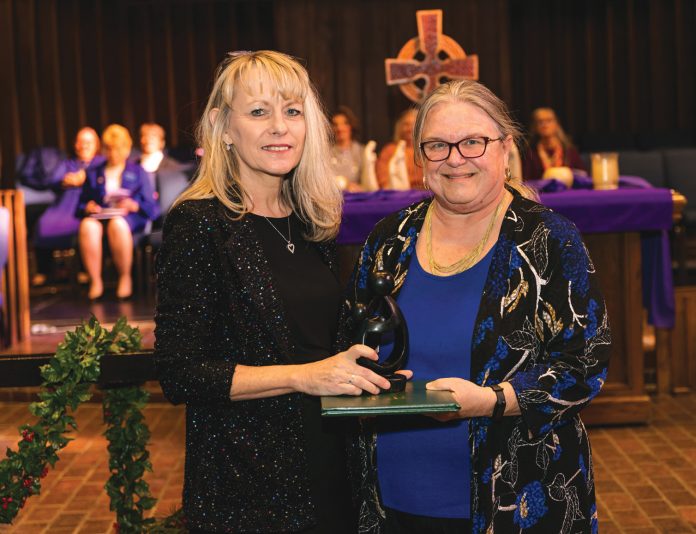
by Van Mitchell, OKNT writer
Dr. Elizabeth Diener, PhD, RN, PNP, CNE, has taught in programs of nursing for the past 30 years in New York, Missouri, and Oklahoma City University’s Kramer School of Nursing.
She said her 13-year stint at OCU has been the most rewarding of her teaching career.
“I can say without a doubt this is the best teaching job that I have ever had,” she said. “They have always encouraged me to explore my own personal research interests, in addition to fulfilling my teaching duties.”
That reciprocation was returned to Diener by her fellow staff members as she was named the 2022 recipient of the DAISY Award for Extraordinary Nursing Faculty.
An acronym for Diseases Attacking the Immune System, The DAISY Foundation was established in 1999 in memory of J. Patrick Barnes who died (at the age of 33) from complications of the auto-immune disease Idiopathic Thrombocytopenic Purpura (ITP).
Barnes’s family was very touched by the remarkable compassion and clinical skill demonstrated by Patrick’s nurses during his illness, so they created DAISY to recognize exceptional nurses everywhere. (STORY CONTINUES BELOW)
Diener said she was humbled by her award recognition.
“It would both serve as a validation of everything that I have done in my past 25 years as faculty,” she said. “It would also be quite humbling because I work with an incredible group of faculty that every day try to do their best to foster faculty and student relationships, and be experts in their field. I feel I am just a representative of all of our faculty.”
Diener currently serves as Professor of Nursing. She is trained as a Caritas Coach in Watson’s Caring Science Institute, holds a certificate as a Soul Collage Facilitator, completed a postdoctoral Fellowship at the University of Arizona in Integrative Nursing Curriculum, and is a certified ANFT Nature and Forest Therapy Guide..
She is currently pursuing her teaching certification in MBSR at Brown University, School of Public Health. Her clinical practice areas have included, Pediatric AIDS Care, Neonatal Intensive Care, Pediatric Emergency Care, ECMO, Hospice and Palliative Care, and Nursing Leadership/Administration.
Diener said her parents encouraged her to pursue a career in healthcare. She said watching nurses care for some of her relatives growing up also influenced her to become a nurse.
“I was encouraged by my parents,” she said. “Women went into nursing or education. Either one would have been acceptable to my parents, but they really had a great respect for healthcare. I just have a real respect for the nurses that I saw and how they could comfort people, and assure them that things would turn out okay. It made me want to be a part of that.”
Diener said she learned early on in her clinical practice she had what it took to handle the stress and chaos that a nursing career can sometimes have.
“I got a really good look at what nursing would involve,” she said. “I knew then I had what it took to become a nurse.”
Diener said her approach to teaching has evolved as has the field of nursing with new technology, medicine, and the impact of the COVID-19 pandemic has had on nursing.
“I think at the beginning I was more concerned with delivering the materials that were required or requested for a particular course, and assessing student performance,” she said. “As it has evolved, it has become not only that, but education has become much more in-depth. We have technology now that wasn’t available back in the day. Our skills have expanded greatly.”
Diener said the pandemic hit the nursing field hard with more nurses leaving the field due to burnout and fatigue.
She said nursing schools like OCU have worked hard to help recruit more nursing students, as well as hospitals and healthcare agencies helping them better transition from student to full-time nurse.
“It’s the quick turnaround from being a student to a functionally-responsible nurse,” she said. “It can be pretty overwhelming at times. Hospitals are trying to address that with internships and transitioning into practice.”
Diener said one message she tells nursing students is to always remember to take care of themselves.
“I think a thing we struggle with is how do we get everything done in the time allotted because there are so many demands,” she said. “I think the challenges will always change as they always do,” she said. “We are fortunate enough to be able to educate larger numbers of nurses. Nurses will get the job done.”
Diener said nursing and teaching is not just her career, it is her passion to help others.
“It is a career I never considered leaving, and one of the reasons is because under the umbrella of being a nurse, there are so many places that you can practice and so many roles that you can fulfill that you can be a nurse and still find your place,” she said.
For more information about Oklahoma City University’s Kramer School of Nursing visit:
https://www.okcu.edu/nursing/home












